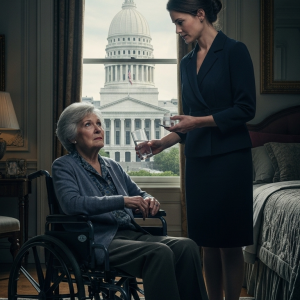The Sunday dinners at the Harrison family home in Boston were not casual affairs; they were institutions. They were held in a grand, mahogany-paneled dining room where portraits of stern-faced ancestors stared down from the walls, their gazes a silent judgment on the present. The air was thick with the scent of old money, lemon polish, and the unspoken weight of expectation. At the head of the long, gleaming table, like a king presiding over his court, sat Dr. Arthur Harrison.
Even in retirement, Arthur carried the unimpeachable authority of the Chief of Surgery he had once been. His posture was ramrod straight, his hands rested on either side of his plate with surgical precision, and his pronouncements on any given topic—from global politics to the proper way to trim a hedge—were delivered with a finality that brooked no argument.
His daughter, Claire, sat halfway down the table, a small, bright island of forced cheerfulness in a sea of formal tension. For the past decade, her sole objective at these dinners had been to navigate the treacherous conversational waters, to steer the family ship away from the rocky shores of her own life choices. She had, eight years ago, committed the cardinal Harrison sin: she had dropped out of Harvard Medical School in her third year to become an elementary school teacher. It was a decision her father had never forgiven, a wound he insisted on poking at every opportunity.
Beside her, a splash of vibrant, untroubled life in the somber room, sat her eight-year-old son, Leo. He was bent over a piece of paper, a fistful of colored pencils in his hand, quietly and happily creating a world of dragons and superheroes, oblivious to the subtle, complex warfare being waged around him.
The first volley of the evening was fired early. Leo, proud of his latest creation, slid off his chair and carried his drawing to the head of the table. “Look, Grandpa! It’s a dragon fighting a space robot!”
Arthur took the drawing, holding it by the edges as if it were a delicate tissue sample. He studied it for a moment, his expression unreadable. “The use of primary colors is certainly… energetic, Leo,” he pronounced, his voice dry and clinical. “But the proportions are anatomically improbable. You have a good mind. You should focus it on science. That is what builds a legacy.” He handed the drawing back, his duty as a critic fulfilled.
Leo, unfazed, simply returned to his seat and began adding more lasers to his robot.
Later, as Claire was telling a genuinely funny story about a student in her second-grade class who had tried to pay for his school lunch with a Monopoly bill, Arthur cut her off mid-sentence.
“Anne, did you see the latest article in the New England Journal of Medicine?” he asked his wife, turning his body away from Claire completely. “Fascinating study on cellular apoptosis. It proves, once again, that rigorous, empirical data is the only path to true understanding.” The message was clear: her world of childish anecdotes was trivial; his world of science was what mattered.
Anne, his wife and the family’s lifelong, weary peacemaker, reached a hand under the table and gave Claire’s a gentle squeeze. Her eyes conveyed a silent, tired apology: Just ignore him, dear. It’s almost over.
The main course was served and cleared in a haze of strained small talk. The conversation eventually, and perhaps inevitably, drifted to the topic of family accomplishments. A cousin’s son had just been accepted into a prestigious residency program. Arthur’s entire demeanor shifted. He sat up straighter, a spark of genuine passion igniting in his eyes. This was his territory. This was the language he understood.
He spoke at length about the rigors of medicine, the nobility of the profession, the sacrifices required to achieve something truly meaningful. His words were a sermon on the virtues of ambition and perseverance, and everyone at the table knew it was a sermon directed at one person.
He paused, taking a deliberate sip of his water. He set the crystal glass down with a soft, definitive click. His gaze traveled down the long, polished length of the table and landed on Claire, pinning her in place. His voice, when he spoke again, was not angry. It was cold, clear, and imbued with the detached, analytical cruelty of a surgeon delivering a terminal diagnosis.
“It is a heartening thing,” he began, his voice loud enough to command the absolute, immediate attention of the entire room, “to see that there are still those in this family who understand the value of a true and rigorous profession. The world is built by people who commit, who persevere through hardship, who do not falter.”
He let the silence hang for a beat, his eyes locked on his daughter’s.
“Not everyone, of course, possesses that particular fortitude. Some people simply… give up. They choose the easy path. And in doing so, they become, for all intents and purposes… a disappointment.”
The final word, “disappointment,” did not land with a shout, but with the devastating quiet of a falling stone in a deep, silent well. It hung in the air, a toxic, shimmering thing.
The blood drained from Claire’s face. The familiar, hot flush of shame, an emotion she had carried since her early twenties, washed over her. She felt the eyes of her siblings, of their spouses, all carefully staring at their plates. But then, something new surfaced through the shame. A profound, bone-deep exhaustion. She was tired of apologizing for her own happiness. She was tired of her life being measured against his cold, unforgiving ruler.
She took a deep, steadying breath. She opened her mouth, the words of a decade’s worth of suppressed arguments finally gathering on her tongue, ready to fight the battle she had always avoided. She was finally ready to speak her truth.
But she would not be the first.
Before a single word could escape Claire’s lips, a different voice, small and clear as a bell, cut through the thick, suffocating silence.
“Grandpa?”
It was Leo.
He had put his pencils down. The world of dragons and space robots had been set aside. He was looking at his grandfather, his head tilted to the side, his expression not one of defiance, but of genuine, profound confusion. He was a small, honest boy trying to solve a puzzle that made no sense.
Every head at the table turned towards him. Claire’s half-formed words of rebellion died in her throat.
Arthur’s brow furrowed in annoyance. The momentum of his grand pronouncement had been broken by a child. “Not now, Leo,” he said, his voice sharp with dismissal. “The grown-ups are having a conversation.” He saw Leo not as a person, but as an interruption, an irrelevant variable in his carefully controlled equation.
But Leo wasn’t trying to be part of the grown-ups’ conversation. He was trying to correct what he perceived as a factual error. He was, in his own way, a scientist, and his grandfather’s hypothesis did not align with his own observed data.
“But Mommy’s not a disappointment,” Leo stated, not as an argument, but as a simple, observable fact, like saying the sky is blue. “She’s happy, Grandpa.”
The direct, artless contradiction seemed to momentarily stun Arthur. He opened his mouth to deliver a cutting retort, to explain to the boy the complex difference between fleeting, childish “happiness” and real, lasting “achievement.” He was about to explain that some feelings were more valid than others.
But Leo, in his earnest, innocent quest for understanding, did not give him the chance. He was not being rude. He was simply continuing his thought, presenting his evidence with the unshakeable conviction of a witness telling the truth. The room remained utterly silent, every person at the table held captive by the simple, unfolding testimony of an eight-year-old boy.
Leo’s gaze remained fixed on his grandfather. He was not challenging him; he was trying to teach him. He was presenting his research, collected over years of quiet, careful observation from a vantage point no one else had.
“When Mommy was a doctor-student,” he began, his voice still holding that note of pure, guileless sincerity, “she used to cry.”
A sharp, collective intake of breath could be heard around the table. Claire felt her own breath catch in her chest.
“She would go into her bedroom after she came home,” Leo continued, his memory clear and unblemished. “She would close the door, but sometimes I could still hear her. It was a quiet crying. The kind you do when you don’t want anyone to know.”
He was narrating a secret history of the family, a history of hidden pain that had been papered over by Arthur’s relentless narrative of success and failure. He was giving voice to the suffering his mother had endured in her desperate attempt to please a father who could not be pleased.
Claire’s eyes flooded with tears. Not tears of shame, but tears of a deep, profound, and unexpected validation. Someone had seen. Someone had known.
Leo then shifted, his expression brightening as he moved on to his more recent, and much happier, data set.
“But she doesn’t cry anymore,” he said, a hint of a smile on his face. “Now, she sings. She sings in the car when we drive to school, and she always sings the wrong words and we laugh. She sings when she’s making pancakes on Saturdays. She’s not crying. She’s singing.”
He had drawn a perfect, irrefutable line between two lives: the prestigious, celebrated path that had produced secret tears, and the “disappointing” path that produced joyful, off-key singing.
He then leaned forward slightly, his small face a mask of earnest inquiry. He looked at the powerful, celebrated, formidable Dr. Arthur Harrison, and he asked the single, most devastating question of his entire life. A question that was not an accusation, but a genuine philosophical inquiry. A question that acted as a precise, emotional scalpel, cutting through decades of pride, ambition, and denial to expose the hollow, aching void at the center of Arthur’s worldview.
“Isn’t being happy better than being a doctor, Grandpa?”
A silence, deeper and heavier than any that had come before, fell over the dining room. It was a silence that was not empty, but filled with the weight of everything that had never been said. It was filled with the silent, emphatic agreement of every other person at the table. Anne, her own face now wet with tears, reached across the table and took Claire’s hand in a grip that was not one of comfort, but of fierce, triumphant solidarity. Claire’s brothers and sisters stared resolutely down at their plates, their refusal to look at their father a quiet, powerful act of mutiny.
The great Dr. Arthur Harrison had been silenced. Not by a complex argument or a bitter confrontation, but by a simple truth, delivered from the pure, untainted heart of a child.
The grand Sunday dinner, the inviolable Harrison institution, dissolved in a quiet, undignified rush. The dessert course was declined with awkward murmurs. Excuses were made about early mornings and tired children. For the first time in anyone’s memory, a family gathering ended not with a formal dismissal from the patriarch, but with a scattered, hasty retreat.
Dr. Arthur Harrison, a man renowned for his sharp wit and his ability to dominate any intellectual debate, said nothing. He had no counter-argument. How could he debate a child’s observation of his own daughter’s tears? How could he refute the sound of singing in a car? Leo’s question had not been an attack to be parried, but a truth to be absorbed, and its weight was crushing him. His authority, built on a lifetime of being right, had been shattered by the simple, irrefutable evidence of a child’s love.
The car ride home was a quiet, sacred space. Claire drove, the Boston city lights blurring past through her own silent tears. They were not the hot tears of humiliation, but the warm, cleansing tears of release. She felt a decade of carrying an invisible weight, of feeling perpetually inadequate, simply melt away.
Leo, sensing the shift in the emotional atmosphere, reached out from his booster seat and placed his small hand on her arm. He didn’t say anything. He didn’t need to. In that simple, quiet gesture, he was offering not just comfort, but his unwavering approval. He was her anchor. He was her truth. And in that moment, Claire understood with a clarity that was almost blinding that her worth was not something to be granted or withheld by her father. It was here, in this car, in the quiet, profound connection with her son, in the life she had built that allowed for laughter and off-key singing.
Back at the grand Harrison house, Arthur sat alone in the silent, cavernous dining room. The remnants of the meal had been cleared away. The ancestral portraits seemed to stare down at him with a new, colder judgment. For his entire life, he had pursued greatness. He had collected degrees, accolades, and honors as if they were pieces of armor. He had pushed his children to do the same, believing that a life of achievement was the only life worth living.
But the silence of the empty house was no longer peaceful. It was accusatory. It was filled with the echo of his grandson’s innocent, earth-shattering question.
Isn’t being happy better?
For the first time, Dr. Arthur Harrison, the man of empirical data and cold, hard facts, had no answer. He was alone with the chilling possibility that he had spent a lifetime meticulously climbing the wrong mountain.
Three months later, the world of Claire’s second-grade classroom was a symphony of controlled chaos. Brightly colored artwork covered the walls, small tables were clustered together for collaborative learning, and the air was filled with the sound of children’s excited chatter. At the center of it all was Claire, sitting in a small chair, a book open in her lap, her face animated as she read a story she had written herself to a rapt audience of twenty-seven eight-year-olds.
She was not just a teacher; she was a magician, a confidante, a creator of worlds. Her eyes shone with a light that no prestigious medical fellowship could ever have ignited. This was not a compromise or a lesser path. This was her calling. This was her joy. Leo was there, too, spending the afternoon as his mother’s official “assistant,” dutifully passing out worksheets with a serious, self-important air.
During a quiet moment, as the children were drawing, her phone buzzed. It was a text message from her mother.
“Your father was just asking for the schedule for Leo’s Little League games. He said he might like to come and watch.”
It was not an apology. The words “I’m sorry” were not in Arthur Harrison’s vocabulary. But it was something more valuable. It was a gesture. It was a quiet, grudging acknowledgment of Leo’s world, and by extension, of hers. It was a first, tentative step off his mountain and into the valley where his daughter had chosen to build her life.
Later that day, driving home, a familiar song came on the car radio. Claire turned it up, a wide, uninhibited smile spreading across her face.
“Oh, this is our song, Leo!” she exclaimed.
Leo, recognizing the opening chords, grinned from the back seat. “Sing the silly words, Mom!” he demanded.
And so she did. They sang at the top of their lungs, their voices a joyful, perfectly imperfect harmony, filling the small car with a happiness that was pure, authentic, and utterly unassailable.
The camera of her life would have focused on her face in that moment—radiant, unburdened, and free. It was a portrait of a woman who had finally, and completely, defined success on her own terms. And it was a life that was, by any measure, a magnificent, resounding triumph.


